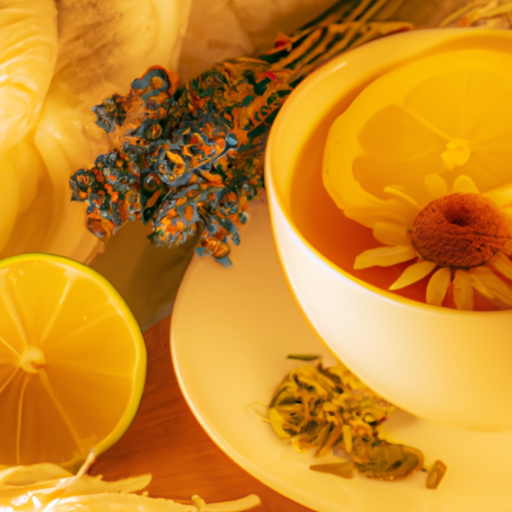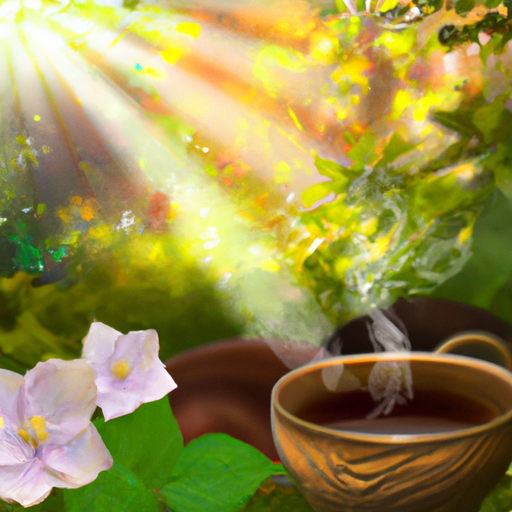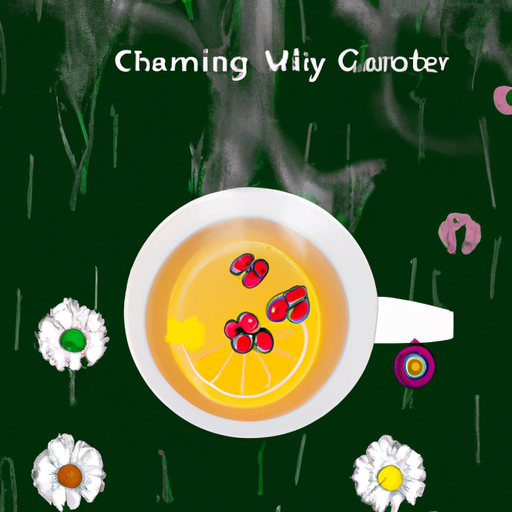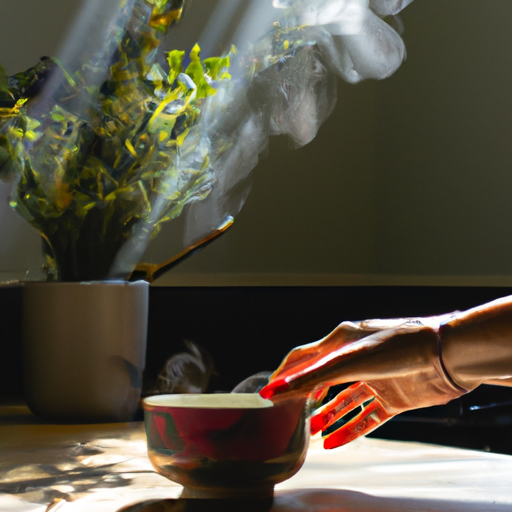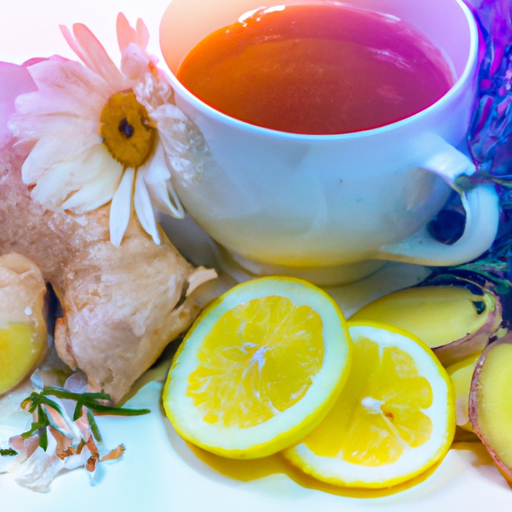When life presents you with lemons, make yourself a comforting cup of herbal tea for your sore throat! We are all familiar with how bothersome and unpleasant a sore throat can be, but do not worry, Mother Nature has given us some incredible solutions.
In this article, I will guide you through the world of herbal teas and share with you the best options to bring relief to your irritated throat.
Picture yourself enveloped in a warm hug from Mother Earth as you sip on a cup of chamomile tea. Its delicate floral notes and anti-inflammatory properties make it a perfect choice for soothing your throat.
Or perhaps you prefer the fiery kick of ginger tea, which not only helps reduce inflammation but also provides a comforting warmth to your throat.
If you’re looking for a refreshing option, peppermint tea can be your go-to choice. The cooling menthol in peppermint can help alleviate the pain and discomfort of a sore throat.
And let’s not forget the classic combination of honey and lemon tea, a timeless remedy that not only coats and soothes your throat but also boosts your immune system.
For those seeking a more unique option, licorice root tea may be just what you need. Known for its anti-viral and anti-inflammatory properties, licorice root tea can provide relief and help fight off any potential infections.
Echinacea tea is another fantastic choice, as it is believed to strengthen the immune system and reduce the duration of a sore throat.
Lastly, we have marshmallow root tea, which may not sound like a typical tea, but it works wonders for sore throats. Its soothing and protective properties can help reduce inflammation and ease the pain.
So, whether you’re a fan of chamomile, ginger, peppermint, honey and lemon, licorice root, echinacea, or marshmallow, there’s a herbal tea waiting to embrace your sore throat and bring you the relief you deserve.
Cheers to natural remedies and a happier, healthier throat!
Key Takeaways
- Chamomile tea boosts the immune system and speeds up healing.
- Ginger tea relieves pain and inflammation, promoting overall wellness.
- Peppermint tea alleviates pain, inflammation, and opens up nasal passages while boosting the immune system.
- Licorice root tea has anti-inflammatory properties and soothes a sore throat.
Chamomile Tea
If you have a sore throat, you should try sipping on a warm cup of chamomile tea – it’ll soothe your throat and transport you to a cozy oasis of relaxation. Chamomile tea, made from the dried flowers of the chamomile plant, has been used for centuries to treat various ailments. Its natural anti-inflammatory properties help reduce throat inflammation and alleviate discomfort.
Chamomile tea benefits also include its ability to boost the immune system, which can speed up the healing process. To make your own chamomile tea, simply steep a chamomile tea bag in hot water for about 5 minutes. Add a teaspoon of honey for extra soothing effects.
Now, let’s move on to another herbal remedy for a sore throat – ginger tea.
Ginger Tea
Ginger tea is a wonderful natural remedy that I’ve found to be incredibly effective in relieving pain and inflammation. It’s been used for centuries for its powerful anti-inflammatory properties. This can help soothe sore muscles and joints.
In addition, ginger tea is known to boost the immune system. It provides a natural defense against illness and promotes overall wellness.
Lastly, ginger tea is a great option for easing nausea and digestive issues. It can help calm the stomach and promote healthy digestion.
Relieves Pain and Inflammation
Peppermint tea, with its cooling and soothing properties, is a delightful remedy for relieving pain and inflammation in the throat. When you sip on a warm cup of peppermint tea, you’ll experience its numbing effect, which can help alleviate the discomfort caused by a sore throat.
The anti-inflammatory properties of peppermint tea can also help reduce swelling and inflammation in the throat, making it easier to swallow and speak.
To fully understand the benefits of peppermint tea for sore throat, here are three key points to consider:
-
Menthol, the active compound in peppermint, acts as a natural pain reliever.
-
Peppermint tea can help reduce inflammation in the throat, providing relief from discomfort.
-
The aromatic properties of peppermint tea can also help open up nasal passages, easing congestion and promoting better breathing.
As we explore how peppermint tea boosts the immune system, it becomes clear that this herbal remedy offers a holistic approach to supporting overall throat health.
Boosts Immune System
By incorporating peppermint tea into my daily routine, I can strengthen my immune system and feel empowered to take on any challenges that come my way. Boosting my immune system is essential to maintaining overall health and well-being.
Peppermint tea contains natural compounds that’ve been shown to enhance the function of my immune cells, helping to ward off illnesses and infections. This herbal remedy is packed with antioxidants and antimicrobial properties, which work together to protect my body from harmful pathogens.
In addition, peppermint tea has a soothing effect on the body, reducing stress and promoting relaxation, which further supports a healthy immune system. So, if you’re looking for natural remedies to boost your immune system, incorporating peppermint tea into your daily routine is a great choice. It’s a simple and enjoyable way to support your body’s defense mechanisms and stay healthy.
Now, let’s explore how peppermint tea eases nausea and digestive issues.
Eases Nausea and Digestive Issues
If you’ve ever experienced an upset stomach or queasiness, you’ll be relieved to know that there’s a natural solution that can bring you quick and soothing relief. Herbal remedies for morning sickness have been used for centuries to ease nausea and digestive issues.
Ginger tea, in particular, has been shown to be effective in reducing symptoms of morning sickness and indigestion. Its natural compounds help to settle the stomach and promote healthy digestion. Another herbal remedy to consider is chamomile tea, which has anti-inflammatory properties that can soothe an upset stomach and relieve indigestion.
These natural remedies provide a gentle and holistic approach to easing nausea and digestive discomfort. With their soothing effects, they can help you feel better naturally.
Now let’s move on to the next section about peppermint tea and its benefits for sore throat relief.
Peppermint Tea
Peppermint tea is a wonderful herbal remedy that provides an instant cooling sensation when sipped. It not only soothes a sore throat but also helps relieve congestion and sinus pressure. This promotes easier breathing. Additionally, this refreshing tea has the power to calm an upset stomach, making it a holistic and natural choice for overall well-being.
Provides Instant Cooling Sensation
Feeling the burn? Brew some refreshing herbal tea for an instant cooling sensation that’ll have your sore throat saying ‘ahhh!’ When it comes to finding natural remedies for instant relief, peppermint tea is a winner. The menthol in peppermint leaves provides a soothing and cooling effect on your throat, alleviating discomfort and reducing inflammation. Plus, its invigorating aroma can help clear your sinuses, giving you a refreshing sensation. To make your healing experience even more enjoyable, sip on a warm cup of peppermint tea while taking a look at this helpful table:
| Herbal Tea for Sore Throat | Benefits |
|---|---|
| Peppermint Tea | Provides instant cooling sensation |
| Chamomile Tea | Soothes irritation and promotes relaxation |
| Ginger Tea | Relieves pain and boosts immunity |
| Licorice Root Tea | Reduces inflammation and eases throat discomfort |
| Echinacea Tea | Boosts immune system and aids in healing |
As you can see, peppermint tea is just the beginning. Stay tuned for more ways in which herbal tea relieves congestion and sinus pressure.
Relieves Congestion and Sinus Pressure
When you’re struggling with congestion and sinus pressure, there’s nothing quite like the relief herbal remedies can provide. Herbal teas are a soothing and natural way to alleviate these uncomfortable symptoms. The right blend can work wonders in clearing your nasal passages and relieving sinus pressure.
Here are three herbal teas that can help ease your discomfort:
-
Peppermint tea: Known for its cooling properties, peppermint tea can provide instant relief by opening up your airways and reducing congestion.
-
Eucalyptus tea: This tea contains compounds that help break up mucus and reduce sinus inflammation, making it a great choice for relieving sinus pressure.
-
Ginger tea: Ginger has natural anti-inflammatory properties that can soothe nasal congestion and promote healthy sinus function.
These herbal teas will not only provide relief but also promote overall well-being.
As we move into the section about calming an upset stomach, let’s explore how certain herbal teas can help in that area as well.
Calms Upset Stomach
Soothing your unsettled stomach is like a gentle breeze on a stormy sea, bringing calm and relief to your digestive woes. When it comes to finding a natural remedy for an upset stomach, herbal teas can provide the calming effects you need.
Chamomile tea is known for its soothing properties, helping to relax the muscles in your stomach and alleviate discomfort. Peppermint tea is another excellent choice, as it can help to ease digestive issues such as bloating and indigestion. These herbal teas offer a holistic approach to soothing your upset stomach, allowing you to find relief without relying on harsh medications.
Now, let’s dive into the next section and explore the benefits of honey and lemon tea.
Honey and Lemon Tea
Honey and lemon tea is a wonderful natural remedy for soothing a sore throat. The warm tea helps to alleviate discomfort and inflammation, while the honey provides a soothing and coating effect.
Additionally, both honey and lemon are known for their immune-boosting properties, helping to fight off any potential infections. Lastly, this delightful tea also offers antioxidant benefits, which can help to protect and nourish the body.
Overall, incorporating honey and lemon tea into your routine can be a holistic and natural way to support your throat health and overall well-being.
Soothes Sore Throat
Feeling a scratchy throat? The best herbal tea to soothe your sore throat is chamomile tea. This natural remedy has been used for centuries to calm inflammation and relieve discomfort.
Here are five soothing herbal teas that can help ease your sore throat:
-
Peppermint tea: Known for its cooling and numbing properties, peppermint tea can provide temporary relief from throat pain.
-
Echinacea tea: This herb is often used to boost the immune system and fight off infections, making it a great choice for sore throats.
-
Ginger tea: With its anti-inflammatory properties, ginger tea can reduce swelling and soothe a sore throat.
-
Licorice root tea: Licorice root has soothing and anti-inflammatory properties that can help relieve throat irritation.
-
Marshmallow root tea: This herb forms a protective layer on the throat, providing relief from pain and inflammation.
These herbal teas not only soothe your sore throat but also boost immunity, helping you recover faster.
Boosts Immunity
One effective way to enhance your body’s defense system is by incorporating immune-boosting beverages like chamomile tea into your daily routine. Chamomile tea is a natural remedy for sore throat that not only soothes the pain but also strengthens your immune system. It contains antioxidants and compounds that help fight off infections and reduce inflammation.
To give you a better idea of the immune-boosting properties of chamomile tea, here is a table showcasing some of its key nutrients:
| Nutrient | Benefits |
|---|---|
| Antioxidants | Protect cells from damage caused by free radicals |
| Flavonoids | Reduce inflammation and boost immune function |
| Polyphenols | Support gut health and promote a healthy immune system |
| Essential Oils | Have antimicrobial properties that fight off infections |
Incorporating chamomile tea into your daily routine not only provides antioxidant benefits but also helps strengthen your immune system. This natural remedy can be a soothing and effective way to support your overall health and well-being.
Provides Antioxidant Benefits
Chamomile tea, with its remarkable ability to provide antioxidant benefits, becomes a superhero elixir for your body, fighting off the villains of cell damage and promoting overall well-being. This gentle herbal tea not only boosts your immune system but also provides respiratory relief, soothing your sore throat and helping you breathe easier. Its anti-inflammatory properties calm any irritation in your throat, while its antioxidants work to protect your cells from oxidative stress. Sipping on a warm cup of chamomile tea not only provides comfort but also enhances your overall well-being.
As I’m discussing licorice root tea, I can’t help but mention that this herbal tea is another powerful ally in the battle against a sore throat.
Licorice Root Tea
To soothe your sore throat, try sipping on a cup of licorice root tea – it’s like a comforting hug for your irritated throat. Licorice root has been used for centuries in traditional medicine for its various health benefits. Here are four reasons why licorice root tea can be beneficial for your sore throat:
-
Licorice root benefits: Licorice root contains compounds that have anti-inflammatory properties, helping to reduce swelling and irritation in the throat.
-
Soothing properties: Licorice root tea has a naturally sweet and soothing taste, providing instant relief and comfort to your sore throat.
-
Immune support: Licorice root tea is known to support the immune system, helping your body fight off any infections causing your sore throat.
-
Potential side effects: While licorice root tea is generally safe for most people, it’s important to note that excessive consumption can lead to high blood pressure. It’s always best to consult with a healthcare professional before adding licorice root tea to your routine.
Transitioning to the next section, another herbal tea that can help alleviate sore throats is echinacea tea.
Echinacea Tea
Echinacea tea is a wonderful herbal remedy that I often turn to when I need to strengthen my immune system. Its natural properties help to reduce inflammation in the body, which can be especially beneficial when fighting off illness.
Additionally, drinking echinacea tea can help speed up my recovery time, allowing me to get back to feeling my best sooner.
Strengthens Immune System
Boost your immune system with a herbal tea that contains powerful antioxidants and natural immune-boosting properties. When it comes to strengthening the immune system and promoting overall wellness, Echinacea tea is a fantastic choice. This herbal tea is known for its ability to enhance the body’s natural defense mechanisms and protect against various infections.
Here are two ways that Echinacea tea can strengthen your immune system:
- It stimulates the production of white blood cells, which play a crucial role in fighting off harmful bacteria and viruses.
- Echinacea tea activates the release of interferons, proteins that help regulate the immune response and prevent the spread of pathogens.
By incorporating Echinacea tea into your daily routine, you can give your immune system the support it needs to stay strong and healthy.
In the next section, we’ll explore how Echinacea tea reduces inflammation naturally, without the need for synthetic medications.
Reduces Inflammation
Reducing inflammation is a remarkable benefit of regularly consuming Echinacea tea, as it helps alleviate discomfort and promotes overall well-being. Echinacea tea is a popular herbal remedy known for its anti-inflammatory properties. It contains compounds that can reduce inflammation in the body, providing relief from sore throat and other symptoms.
To better understand the benefits of Echinacea tea in reducing inflammation, let’s take a look at the following table:
| Echinacea Tea and Reducing Inflammation | |
|---|---|
| Reduces swelling | Relieves pain |
| Soothes irritated tissues | Boosts immune system |
| Supports healing process | Enhances overall wellness |
By incorporating this natural herbal remedy into your routine, you can experience the soothing effects it offers. This holistic approach to reducing inflammation not only helps with sore throat but also promotes a healthy immune system. Furthermore, it sets the stage for the subsequent section, where we will explore how Echinacea tea speeds up recovery from illness.
Speeds Up Recovery from Illness
After discussing how herbal teas can reduce inflammation and soothe a sore throat, let’s now explore how they can help speed up recovery from illness.
When it comes to natural remedies for respiratory infections, herbal teas play a vital role. They’re packed with antioxidants and nutrients that support the immune system and promote overall wellness. These teas can help alleviate symptoms like coughing, congestion, and fatigue, allowing the body to heal more efficiently.
Sipping on a warm cup of herbal tea provides comfort and hydration, while the medicinal properties of the herbs work their magic. By incorporating herbal teas into your daily routine, you can give your body the extra support it needs to recover from illness and restore balance.
Now, let’s dive into the benefits of marshmallow root tea.
Marshmallow Root Tea
When it comes to soothing a sore throat, one of my favorite herbal teas is Marshmallow Root Tea. This tea is known for its ability to form a protective coating in the throat, which can help alleviate discomfort.
Additionally, Marshmallow Root Tea is great for soothing dry and irritated throats, providing much-needed relief. And if you’re dealing with a cough or hoarseness, this tea can also help calm those symptoms.
Overall, Marshmallow Root Tea is a natural and holistic option for those looking to find relief for their throat issues.
Forms Protective Coating in Throat
Imagine sipping on a warm cup of soothing herbal tea that forms a protective coating in your throat, providing relief from that pesky soreness. Marshmallow root tea is one of the best protective throat remedies among natural sore throat remedies. It contains a substance called mucilage, which when mixed with water, creates a gel-like coating that soothes and protects the throat. This natural remedy has been used for centuries to alleviate throat discomfort and promote healing. To give you an idea of the healing properties of marshmallow root tea, take a look at the table below:
| Healing Properties |
|---|
| Soothing |
| Protecting |
| Nourishing |
| Moisturizing |
| Calming |
This holistic approach to soothing a sore throat not only forms a protective coating but also soothes dry and irritated throat, providing you with the relief you need.
Soothes Dry and Irritated Throat
After discussing how herbal tea forms a protective coating in the throat, let’s explore how it can soothe a dry and irritated throat.
When I have a sore throat, I turn to natural remedies and homeopathic treatments, and herbal tea has always been my go-to choice. The warm, soothing liquid gently coats my throat, providing instant relief and reducing discomfort. The natural ingredients in herbal tea, such as chamomile, licorice root, and slippery elm, have incredible healing properties that calm inflammation and promote hydration. They work together to soothe the dryness and irritation, allowing my throat to feel refreshed and revitalized.
By incorporating herbal tea into my daily routine, I’m able to alleviate the discomfort of a sore throat in a holistic and natural way.
Now, let’s dive into how herbal tea relieves cough and hoarseness.
Relieves Cough and Hoarseness
To find relief from a nagging cough or hoarseness, I rely on the comforting properties of a warm cup of herbal infusion. Herbal teas have been used for centuries to soothe a dry cough and calm an irritated throat.
One of the best herbal teas for this purpose is licorice root tea. Licorice root contains compounds that have expectorant properties, helping to loosen and expel mucus from the respiratory tract. It also has anti-inflammatory properties that can reduce irritation in the throat.
Another great option is marshmallow root tea, which forms a protective layer over the throat, providing relief from coughing and hoarseness.
These herbal teas are a natural and holistic way to alleviate cough and soothe a sore throat, allowing us to find comfort and relief in the healing power of nature.
Frequently Asked Questions
Can I drink herbal tea if I have a sore throat caused by a bacterial infection?
Yes, drinking herbal tea can help soothe a sore throat caused by a bacterial infection. The natural properties in herbal tea can reduce inflammation and provide relief. It’s a gentle and effective alternative to conventional treatments.
Are there any side effects or potential risks associated with drinking licorice root tea for a sore throat?
I haven’t experienced any side effects from drinking licorice root tea for a sore throat. In fact, I’ve found it to be soothing and beneficial. It’s a natural remedy that can help relieve inflammation and alleviate discomfort.
Can echinacea tea be used as a natural remedy for other respiratory symptoms, such as cough or congestion?
Echinacea tea, known for its immune-boosting properties, can help alleviate respiratory symptoms like cough and congestion. Additionally, chamomile tea promotes relaxation, aiding in better sleep. These herbal remedies offer holistic alternatives for respiratory issues and sleep troubles.
Is it safe to consume marshmallow root tea for a sore throat while pregnant or breastfeeding?
It is important to exercise caution when consuming herbal teas during pregnancy or breastfeeding. While marshmallow root tea may provide relief for a sore throat, it is best to consult with a healthcare professional for safety precautions. Other herbal teas like chamomile or ginger may also help soothe a sore throat naturally.
Can I mix different types of herbal teas together to create a more potent remedy for my sore throat?
Mixing different types of herbal teas can create a more potent remedy for a sore throat. Studies show that combining certain herbs like chamomile, ginger, and licorice can enhance the effectiveness of herbal tea combinations.
Conclusion
In conclusion, when it comes to soothing a sore throat, herbal teas can be a natural and effective remedy. Whether you choose chamomile, ginger, peppermint, honey and lemon, licorice root, echinacea, or marshmallow root tea, each option offers unique benefits to help alleviate discomfort. Interestingly, studies have shown that licorice root tea can reduce inflammation and pain in the throat, providing much-needed relief.
So next time your throat feels scratchy, consider turning to the power of herbal teas for a holistic and natural approach to healing.

